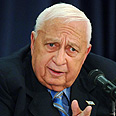
Blind faith with daddy at home: Sharon
צילום: לע"מ
End of infancy
Whoever inherits Sharon's mantle must be more convincing than his predecessor
Ariel Sharon's five years in power were a time of public infantilism in Israel. In September, 2000 reality was turned on its head for a large segment of Israeli society: The dream of peace evaporated, and most people bought Ehud Barak's line that "We offered them everything and they said 'no.'" The meaning was clear: "we've got no one to negotiate with, and that's not going to change."
Since this political-security crash was accompanied by an economic crash, the result of world-wide financial trends together with the intifada, most Israelis found themselves in a threatening, frightening situation that it simply seemed impossible to deal with.
Since then, like a group of scared children, just about everyone has rallied behind this huge father figure, a man who weathered other difficult times.
He never said what he actually intended to do, and for a long time he did nothing (and still won the 2003 election in a landslide). Afterwards, he did a lot but never bothered explaining. The public didn't care. At least daddy was home.
Mythic giant
This was also the situation leading up to the 2006 elections, at least until Wednesday night. Our infantilism was such that no one really cared what Sharon's plans were, if there would be more unilateral disengagements or not (as he, himself, claimed and only a few people believed him) or what he did plan to do.
Sharon's seasoned image consultants created an image of mythic proportions: He was an incredible giant, a throwback to a different age. Others could never approach him.
The public willingly disengaged from the thought process and was completely willing to hang the country's fate on the shoulders of one man.
Return to adulthood
In this context, the post-Sharon era will be a return to adulthood. People who now support Ehud Olmert, Benjamin Netanyahu, Amir Peretz or any other candidate won't be able to hang their support on old myths like crossing the Mitla Pass or the early days of the settlement push.
The people seeking to fill Sharon's shoes must present some sort of ideology, a support staff and agenda that will speak to potential voters – because their personal images will not encourage the sort of blind faith that Sharon merited.
On the diplomatic front, the days of "Arik will know what to do," and it's twin phrase, "Only Arik can do what needs to be done" are over – two phrases that have helped Israelis, politicians and simple citizens alike, to avoid responsibility for what's going on around them.
His heirs – until further notice, Ehud Olmert, and anyone else wanting to inherit the mantle of leadership – will not be able to escape the results of their actions and their words like Sharon has done.
Shrug of the shoulder
Sharon could hold back from responding to Qassams from Gaza or Katushyas from Lebanon, and with a shrug of the shoulder could ignore those who viewed these events as a direct consequence of Sharon's actions and failures.
Future prime ministers will have to explain, to convince – and the convinced public will bear responsibility for those choices.
There are many reasons to choose them: Israel's relationship to the internal disputes of the Palestinian Authority, the possibility that Hamas will gain power and perhaps join the government; preparations for potential conflict, especially if Israel is blamed for a delay in Palestinian elections; dealing with security challenges near and far, delineating responsibility between different branches of Israel's security establishment.
These, and dozens more reasons, most of which Sharon never dealt with but most Israelis believe he is the most suited to deal with.
Daddy's gone. From now on, childhood is over.










